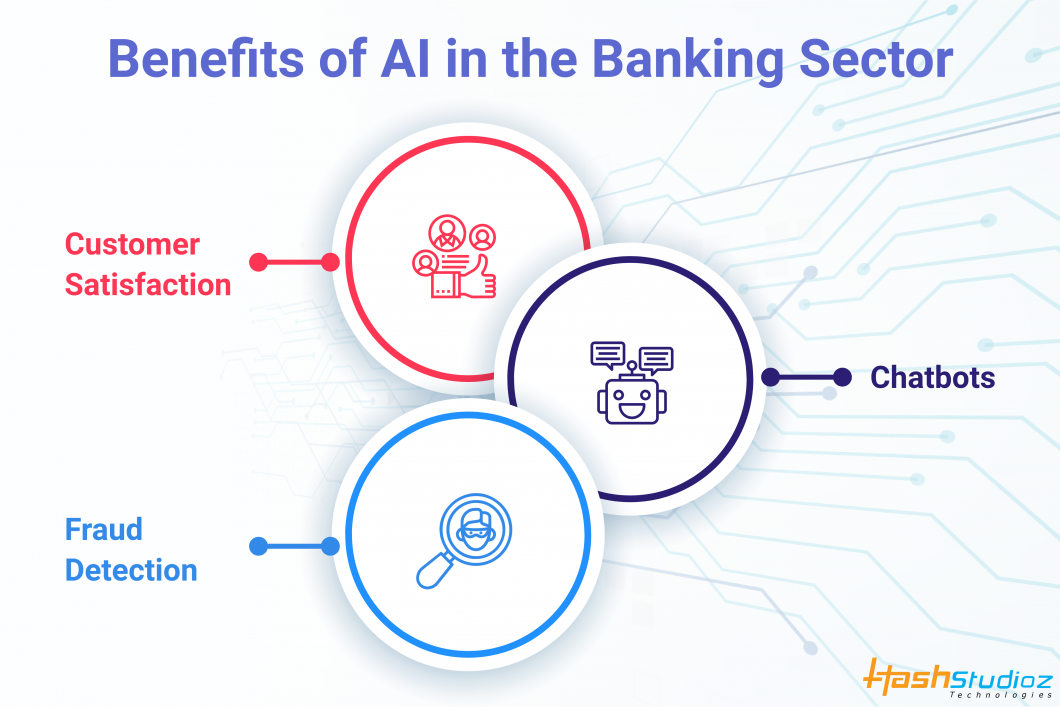What is the first thing that comes to mind when you think of Artificial Intelligence in the banking industry? Isn’t it possible that robots or robotics engineering could help you with your daily tasks? Artificial intelligence (AI) is the duplication of human mental processes by machines, particularly computer systems. Artificial intelligence is sometimes known as machine intelligence (AI).
The banking sector is rapidly moving toward technology because it includes the world’s wealth in databases and transactions that simply transport information over networks. New technology, particularly artificial intelligence (AI), could benefit the industry in a variety of areas, from accounting and sales to contracts and cybersecurity.
Artificial intelligence in banks is increasingly collaborating with financial technology (FinTech) companies to deliver improved banking solutions to their consumers as part of their digitization efforts. According to research, AI is expected to save banks $447 billion by 2023.
Table of Contents
- What Is Artificial Intelligence in the Banking Sector?
- Why Is Artificial Intelligence (AI) Being Used In Banking?
- What Is The Process Of Artificial Intelligence (AI)?
- Benefits Of AI In The Banking Sector
- Future Of Artificial Intelligence In The Banking Industry
- Artificial Intelligence Challenges In The Banking Industry
- Artificial Intelligence’s Role In Banking
- How Can A Tech Partner Like Hashstudioz Help in Better AI Deployment?
What Is Artificial Intelligence in the Banking Sector?
In recent years, the banking industry has seen ground-breaking advances as a result of the use of cutting-edge technologies. They are also expanding their industrial landscape to include retail, Information Technologies, and telecommunications in order to provide mobile banking, e-banking, and real-time money transfer services.
Using this cognitive technology with AI allows banks to profit from digitalization and compete with agile Fintech companies. According to research conducted by the National Business Research Institute and Narrative. In Science, almost 32% of financial service providers are already using AI services such as Voice Recognition and Predictive Analytics.
The role of artificial intelligence in banking is increasingly being adopted by trending banking apps for a variety of reasons, including increased competition in the banking sector, a push for process-driven services, consumer demands for more customized solutions, increased employee productivity, a vision to expand hub man work through the use of software robotics, creating operational efficiencies, making effective decisions and actions, and much more.
Why Is Artificial Intelligence (AI) Being Used In Banking?

This generation’s face is technology. There is an increasing demand for solutions to all the problems that this generation is facing. And they’re looking for answers at the tip of their fingertips. A machine or a human relations manager may be on the other side of the screen, addressing queries.
Big data is now the best choice, and every company is trying to extract as much information as possible from unstructured data banks. Artificial intelligence in the Fintech domain is already transformed by big data applications. Artificial Intelligence is now a reality. The finance and banking industries are stepping in to exploit this data to improve client relations not just by using the benefits of AI in extracting and organizing the data at hand.
What Is The Process Of Artificial Intelligence (AI)?
Machine learning is used by Artificial Intelligence to duplicate human intelligence. Artificial intelligence allows machines to do tasks that need human intelligence. To build a propensity model, AI trends like robots use algorithms and historical data. The impact of AI in banking applications is influenced by a variety of concepts, approaches, and technologies, which include:
- Machine Learning– It improves the creation of analytical models. It also uses machine learning, physics, statistics, and operations research to find deep data insights without having to rely on pre-programmed beginning and stopping points.
- Neural Network– A neural network is a type of machine learning that is still under development, comprising connected units that process data by responding to external inputs and transmitting data between them. To uncover links and make sense of confusing facts, this technique demands repeated runs through the data.
- Deep Learning– To discover detailed patterns in large data sets, deep learning employs massive neural networks, processing units, increases in computing power, and well-established training methodologies.
- Cognitive Computing– This field of AI aims to communicate with robots in a natural, human-like manner. The goal of AI and cognitive computing is for robots to mimic human intelligence by analyzing sights, recognizing speech, and responding in human-like ways.
- Natural language processing (NLP)– Natural language processing (NLP) is the ability of a computer to read, understand, and generate human language, such as speech. Human-robot communication is possible via natural language interaction.
Benefits Of AI In The Banking Sector

- Customer satisfaction: Customer satisfaction is an important requirement not only for the banking industry but for all industries. Every customer. excepts the bank to provide them with personalized and timely services, but how? Artificial Intelligence helps the bank not only increase revenue but also make faster decisions and maintain healthy client connections.
- Chatbots: Have you ever had a chat with the bank by making use of chatbots? This AI provides use of Natural Language Processing to give relevant answers to the different inquiries of the customers. Chatbots are basically automated conversation programs that operate automatically or follow a pre-determined course. Chatbots are now being used in the banking industry to provide consumers with a 24/7 service experience.
- Fraud Detection: Banking fraud is one of the most feared topics among the public because monetary losses are extremely difficult to recover from. However, the banking industry can reduce the chance of such activities by significantly using Artificial Intelligence.
Future Of Artificial Intelligence In The Banking Industry
Digital technology is impacting almost every industry, not just changing industries but also changing the way businesses operate. Every industry is currently analyzing options and implementing strategies to succeed in this tech-driven world.
Nowadays, every country is moving ahead in terms of digitalization, and this is the reason the number of customers is continuously growing in the banking sector. Now the question arises is how the banking sector can assist more and more customers without increasing workforce expenses.
It is challenging for industries to match the unique demands of the customers. Customers today have extremely high expectations. Nowadays, customers are digitally sophisticated and expect industries to provide them with a pleasant and comfortable customer experience, the same thing they also expect from the banking sector.
To meet the expectations of the customers, the banking sector has expanded its reach into retail, IT, and telecom fields to provide services like mobile banking, e-banking, and real-time money transaction. These advanced features provide customers to avail banking at their fingertips, but they come at a cost to the banking industry.
The engagement of IT, telecom, and retail has increased the probability of transferring confidential information over virtual networks. Sometimes, it causes cyber-attacks and fraud in the banking sector. This kind of fraud not only affects the bank in terms of funds but also affects the trust of the people.
In the banking industry, the primary goal of artificial intelligence is to assist consumers by prioritizing their choices. Artificial Intelligence also helps to ensure that consumers are satisfied with the bank’s services. AI or machine intelligence helps the bank in understanding consumer expectations.
Artificial Intelligence Challenges In The Banking Industry

- Many banks struggle with upgrading or adapting to new methods due to their reliance on standardized, fixed processes. This challenge particularly affects locations in tier two and tier three cities across the country. These companies also lack the commitment to upskilling their personnel and human resources.
- Banks that use artificial intelligence on a larger scale are required to follow government regulations. Increased services such as net banking and online transactions are subject to privacy regulations requiring the bank to follow them.3- In addition, there is a significant lack of training among the current workforce in terms of advanced technologies and the usage of artificial intelligence in banking. As artificial intelligence becomes more popular, there are a strong number of qualified workers. Experts with expertise in domains like data science and machine learning are necessary to provide credibility to the data at hand.
Artificial Intelligence’s Role In Banking
The following is a list of artificial intelligence applications in the banking industry:
- Personalized Finance Guidance: Artificial intelligence in finance helps clients make quick and accurate financial decisions by presenting them with the most up-to-date market information. As a result, we can assume that AI can assist customers with personalized financial guidance.
- Digital Wallets: Digital wallets have undoubtedly pushed the digital money movement to new heights. Customers can buy anything online by just submitting their cellphone number or a one-time password (OTP), which is a unique feature of digital wallets.
- Interactive Voice Response System (IVRS): Customers are contacted with an interactive voice response system (IVRS). The main purpose of this application is to give customers a great banking experience by responding to their queries correctly.
How Can A Tech Partner Like Hashstudioz Help in Better AI Deployment?
Artificial intelligence in banking is a significant project. It requires a lot of information, a lot of effort, and a commitment to correctness. We don’t just follow trends. Instead, we’ll look at how artificial intelligence may help you with your unique banking needs.
If you’re looking for Artificial Intelligence Development Services, contact us. We can assist you in developing and implementing a long-term AI in banking strategy that fits your goals in the most technologically and cost-effective manner.
At HashStudioz an Artificial Intelligence Development Company, we work with banks and financial institutions on different custom AI and ML-based models that help in increasing income, lowering expenses, and limiting risk in various areas.


